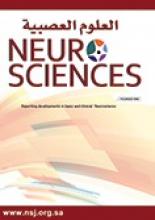Abstract
Dysphagia, or swallowing difficulty, is a common problem following severe traumatic brain injury and is associated with an increased risk of malnutrition and pneumonia. Management of patients with dysphagia following head injury is complicated by the presence of cognitive, communication, and behavioral impairments. The purpose of this review article is to help physicians taking care of traumatic brain injury patients understand and manage dysphagia. The article reviews the history of the study of swallowing, stages of swallowing, impairments of swallowing, neural control of swallowing, and the evaluation of patients with swallowing difficulties and their management. In addition to the general principles of dysphagia management, this article covers the management of dysphagic patients with tracheostomy and their nutritional management.
- Copyright: © Neurosciences
Neurosciences is an Open Access journal and articles published are distributed under the terms of the Creative Commons Attribution-NonCommercial License (CC BY-NC). Readers may copy, distribute, and display the work for non-commercial purposes with the proper citation of the original work.






